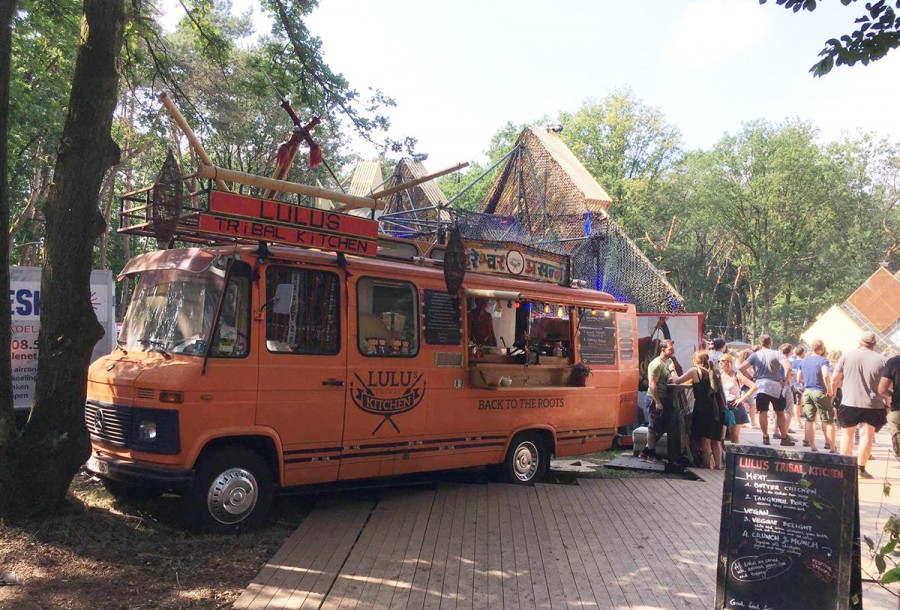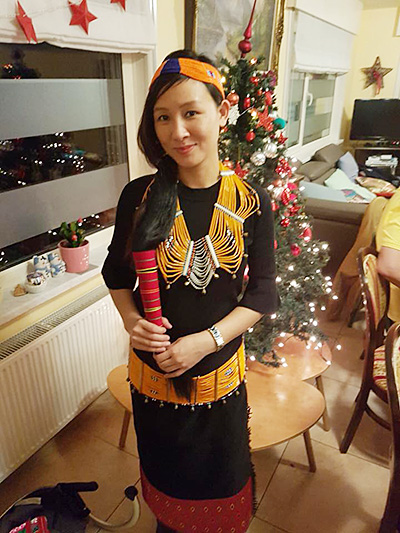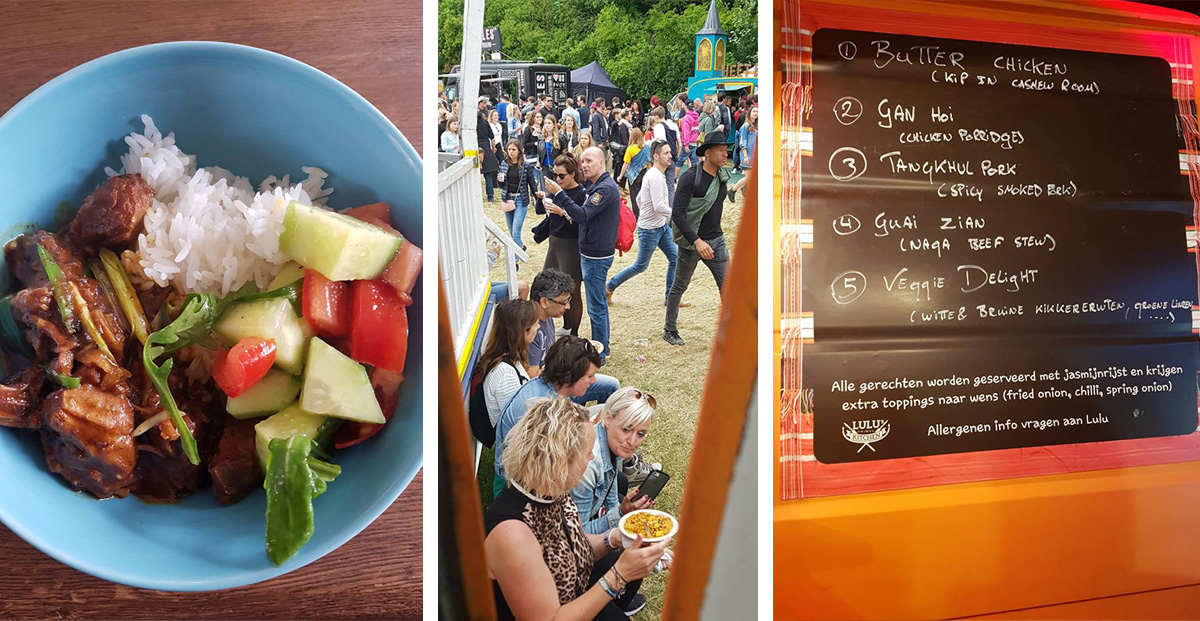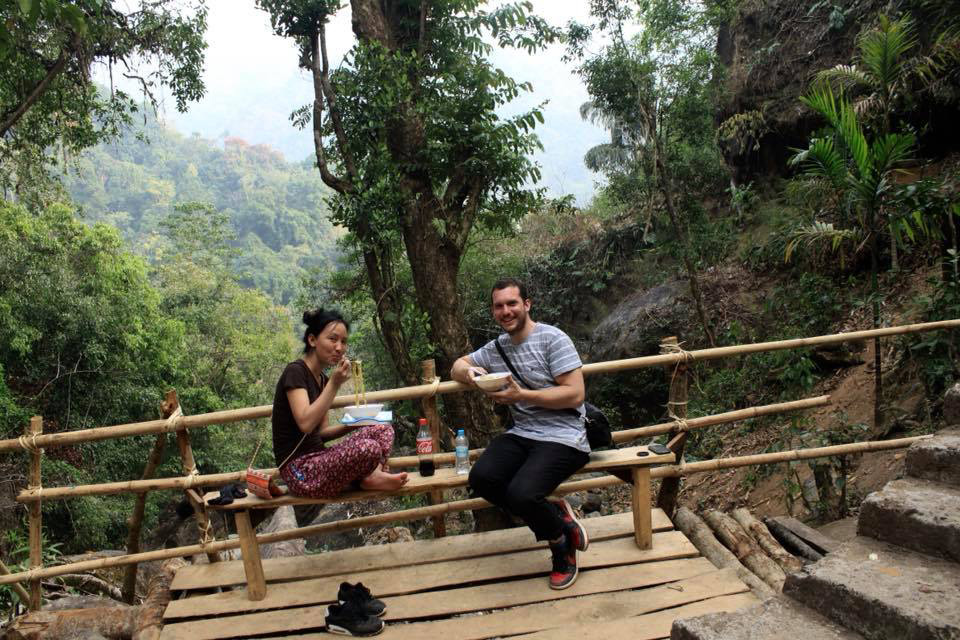Lulu’s Food Truck
A Manipuri lady introduces Northeastern cuisine to Western Europe as she travels around in her food truck

When you eat your own food, it brings you closer to home
When Lulu, or Landimliu Pheiga Gangmei was growing up in Manipur, her favourite dish was dal and rice. “We were a large family of eight, we didn’t have spreads of meat and rice everyday. My favouritefood, possibly because we ate it most frequently, was Manipuri dal and rice. When we were lucky, wehad it with oil and spices, otherwise just that!” she fondly remembers.
 Today, the same dal and rice arethe staple in the menu in Lulu’s food truck that she runs with her husband Bob Staal in Genk, Belgium. Called ‘Lulu’s tribal kitchen’, the truck travels around Western Europe bringing Northeastern cuisine to people who have never heard of it before. In fact, people are even surprised to know she is Indian. ‘You’re Indian? You don’t look Indian, they say’. But Lulu is not perturbed by such queries, rather she is on a mission – she wants to tell the world through her truck, that she is Indian, and the food is a part of India.
Today, the same dal and rice arethe staple in the menu in Lulu’s food truck that she runs with her husband Bob Staal in Genk, Belgium. Called ‘Lulu’s tribal kitchen’, the truck travels around Western Europe bringing Northeastern cuisine to people who have never heard of it before. In fact, people are even surprised to know she is Indian. ‘You’re Indian? You don’t look Indian, they say’. But Lulu is not perturbed by such queries, rather she is on a mission – she wants to tell the world through her truck, that she is Indian, and the food is a part of India.
Lulu grew up in a village (it was in a city but had a village atmosphere) called Neikanlong on the foothills of the mountains near Imphal. Her family, which belongs to the Naga tribe of Kabui,would go to the market to buy ingredients for food, but also forage for other household necessities. Like most individuals who grew up in the Northeast of India, the aroma of fresh chillies or roasted spices are firm in Lulu’s memory.
While Lulu had always watched her mother cook, it wasonly when she moved to Delhi for higher studies that she first begun to cook on her own. “When I was far away from home, I needed home food like never before” she says. “When you eat your own food, it brings you closer to home,” she adds.
Today, her truck is a symbol of the same sentiment. While Lulu livesin Genk, Belgium with her husband and daughter, part of her is still in Imphal. When asked if the venture is for herself or for customers, she says, “a bit of both, obviously, that is why it is so great.”
Apart from Manipuri dal and rice, Lulu’s tribal kitchen offers many other dishes: Tangkul pork, a smoked stewy dish that has its origins in the Tangkul tribe which is made from a dry chili powder; Veggie delight, a mixed vegetable dish cooked with dry peas, chickpeas, and a spice called ‘Utti’ prevalent in Manipuri cuisine, a dry chilli of fermented soya bean and Lulu’s beloved bhut jolokia, and one mainstream Indian dish for those who want to eat something they are already familiar with.

“The thing is, no one has heard of Northeast Indian food, so I try to keep butter chicken as a sort of anchor in the food truck,” laughs Lulu as she says this. “It’s a part of our customer tactic! But lots of people want to try new things, so they order the tangkul pork or the Veggie delight.”
Lulu also says that the bhut jolokia chutney she puts out is a big surprise to everyone who eats it. “I sell it too, so I put it out on the counter for people to try when they come to the truck.It is very spicy, I tell them! But they like it!” She believes that “something as simple as the perfect tej patta can change the whole face of a dish”. The fact about Northeastern cuisine is, says Lulu, “It is simple, but it is powerful. And people should know that.”
Before she started her truck, Lulu learnt a new language, trained in a French restaurant and honed up on business skills. The fact that the food truck has been doing brisk business, is proof that Lulu set her heart into it completely.
These days, the truck has had a busy season.It has travelled to PinkPop music festival in Holland, Reggea Gael in Belgium, Made in Asia: a festival of food from the Asian continent, and many others. Lulu talks of busy days spent preparing food for thousands of people, and managing her four-month-old daughter, who sometimes travels with her.Bob, her husband, who has had experience in running a restaurant in Pushkar, Rajasthan, is an equal proprietor and agent of the truck’s business.Without him, Lulu says, the venture would not have been possible.

“Running a food truck is difficult,” says Lulu. “You have to be fully prepared. There is not much space. It is about speed and organisation as much as it is about technique. When season gets busy we are tired out! But we still love to do it, so it’s good,” she says with a smile.
“When we first started, food trucks were not such a big thing, so, it was relatively easy to break in. But now, things have gotten more competitive.So, maybe in the coming years they will get harder,” she adds.
While Lulu attributes her ability to get into every food festival with her truck as luck, in truth it is because of her cooking skills and her tribal kitchen being one of its kind in Belgium’s culinary landscape. In music festivals in Europe, food is normally of the fried, European and familiar variety, so, when Lulu takes fermented curries and fresh rice to the same audience, she stands out.
Now, Lulu plans a trip to India with her daughter and husband, where she even plans to stay for a while. “I haven’t been to India in two years, so I don’t have any ingredients!” she says.She sources all her ingredients from Manipur and Nagaland. “So I have to go back.”
But she will return, armed with fresh ingredients and new flavours to give Europe a taste of her home.

